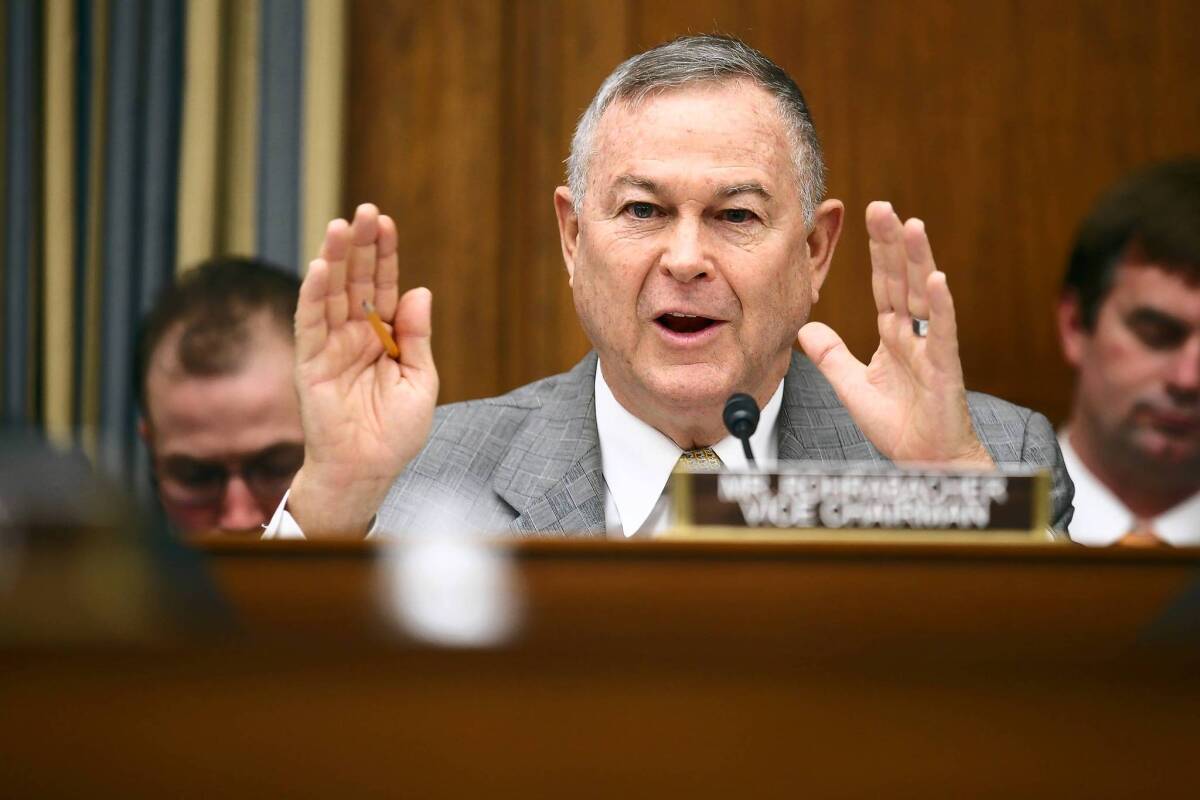California conservative defends state’s pot law in Congress

- Share via
WASHINGTON — For more than a decade, conservative Orange County Rep. Dana Rohrabacher has formed an unusual alliance with liberals on an unexpected topic — the defense of marijuana.
Rohrabacher (R-Huntington Beach) and his allies have so far waged a futile effort to pass legislation that would prevent federal authorities from interfering with medical marijuana use in California and other places where pot use is permitted by state law.
But as more states have moved to allow the drug’s use, Rohrabacher believes his Respect State Marijuana Laws Act may be gaining momentum in Congress.
The recently reintroduced measure would shield from federal prosecution people acting in accordance with their states’ marijuana laws, including new Colorado and Washington laws that allow adult recreational use of the drug.
“The prospects are much better now,” said Rohrabacher, whose co-sponsors include Rep. Barbara Lee (D-Oakland), a Bay Area liberal who is usually about as far apart ideologically from Rohrabacher as anybody in Congress.
Still, Rohrabacher has his work cut out for him. The House last year soundly rejected, by a 262-163 vote, an effort he led to block the use of federal funds to prevent states from implementing medical marijuana laws. Only 28 Republicans supported the measure.
Rohrabacher has a libertarian bent but became more interested in the medical benefits of marijuana after having to spoon-feed his dying mother because of her loss of appetite. He has talked about the relief that marijuana might have afforded her.
He has been emboldened by a recent Pew Research Center poll that showed respondents, by nearly 2 to 1, believe the federal government should not enforce federal laws prohibiting the use of marijuana in states where it is legal.
Perhaps as important as the shifting public opinion, he said in an interview, is his colleagues’ eagerness to erase Washington’s red ink. Substantial majorities of Republicans and Democrats in the Pew survey regarded federal enforcement of anti-marijuana laws as not worth the cost.
“If people of the states recognize what a waste of limited resources this is, then the federal government should respect what the people of those states want for their own criminal justice system,” Rohrabacher said.
Since 1996, when California became the first state to legalize the drug’s use for medical treatment, 17 other states and the District of Columbia have approved medical marijuana measures. Last year, Colorado and Washington state voters opted to allow recreational users to possess an ounce of marijuana. A move is underway to put a measure on the Alaska ballot to permit recreational use of the drug.
Efforts are underway in other states, including Idaho, Illinois and New Hampshire, to allow medicinal use of marijuana.
Rohrabacher also is hoping to convince GOP colleagues that his bill fits with the party’s traditional support for states’ rights.
“It is time that we respect states’ rights, get serious about prioritizing our federal government’s activities, and show some common sense and compassion when dealing with the sick among us,” Rohrabacher said last year when he proposed his measure.
However, Rep. Frank R. Wolf (R-Va.), chairman of the appropriations subcommittee that oversees Justice Department spending, responded at the time: “If a state said sex trafficking is OK, would we honor that?... States, in the past, have done some things that have not been good in this country.”
The president’s drug czar, R. Gil Kerlikowske, recently said at the National Press Club that the Justice Department was responsible for enforcing the Controlled Substances Act, and “that remains unchanged. No state, no executive, can nullify a statute that’s been passed by Congress.”
Kevin Sabet, a former advisor to Kerlikowske, said Rohrabacher’s latest attempt would “likely suffer the same fate as his several previous failed attempts have over the past decade.”
Steve Fox, national political director for the Marijuana Policy Project, which promotes legalization, regards the bill as a long shot in this congressional session. But he said the legislation “sends the message that it is simply not a rational use of federal law enforcement resources to prosecute and imprison individuals who are acting in compliance with state marijuana laws.”
More to Read
Sign up for Essential California
The most important California stories and recommendations in your inbox every morning.
You may occasionally receive promotional content from the Los Angeles Times.














